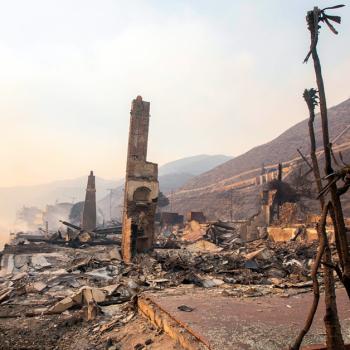Because Amaziah thinks of Amos as a threat, he confronts him by saying, "O seer (in effect he calls Amos a fortune-teller, a cheap-trick magician) go back to Judah, earn your bread there, prophesy there. Never again prophesy at Bethel, because it is the king's sanctuary; it is the temple of the kingdom" (Amos 7:12-13). You clearly are in this for money, Amaziah claims, so go back south where you came from and earn whatever your soothsaying may earn there. But do not ply your trade of mountebank here, because this place is the king's place; it is the central temple of the kingdom.
This is a most telling comment. Amaziah makes it plain that his house of worship has little to do with YHWH, but everything to do with Jeroboam. Powerful places of worship have no truck with those who threaten their power, so those who threaten must be made fun of, reduced to evil players in a larger game of conspiracy. The church has been compromised by the state and has become merely a rubber stamp for what the state desires.
Amos's answer has been the source of much commentary: "I no prophet, nor the son of a prophet. Rather I am a herdsman and one who treats of the sycamore figs. YHWH took me from following the flock and told me to go and prophesy to the people of Israel. And so, here I am" (Amos 7:14-15). Because there is no verb in Amos's retort, he could either be saying that he "is" no prophet or that he "was" no prophet. If the former, he avers to Amaziah that he is something quite different than a soothsayer, as the high priest supposes, or if the latter, he was not trained to prophecy but now has become prophet under the call of YHWH. Either way, Amos rejects Amaziah's claims about his status completely. And Amos concludes the confrontation with a devastating personal assault against the high priest. Because Amaziah has demanded that Amos stop his preaching (Amos 7:16), Amos thunders that Amaziah's wife will become a whore, his children will be slaughtered, his property seized, and his death will occur in a foreign, hence unclean, land (Amos 7:17). These indeed are terrible and cruel words.
Well, is it not far clearer why Amos is in the main silent in the pulpits of the 21st century? In a time where we want to hear that we are loved by our loving and caring God, old Amos's unremitting tone of fury is hardly what any of us hunger to hear. What to do with him? We must make a place for him today. His uncompromising demands for justice, his withering unwillingness to allow vacuous worship to cover over our unwillingness to care for the poor and needy of the land, his continual call for overt concern for those among us who are in great need, his thorough rejection of the comingling of church and state, are themes that never go out of style. Of course, if Amos were a Methodist, he would serve a different congregation every Sunday! We must address his concerns, albeit in such a way that our people will hear them and act upon them. It will not do for us to continue to ignore him, because without Amos we run the risk of preaching at best half a gospel, which I think is to preach no gospel at all. Surely we can give him two weeks of pulpit time (we will hear from him next week, too); he deserves at least that, and our people and we deserve it and desperately need it, too.





